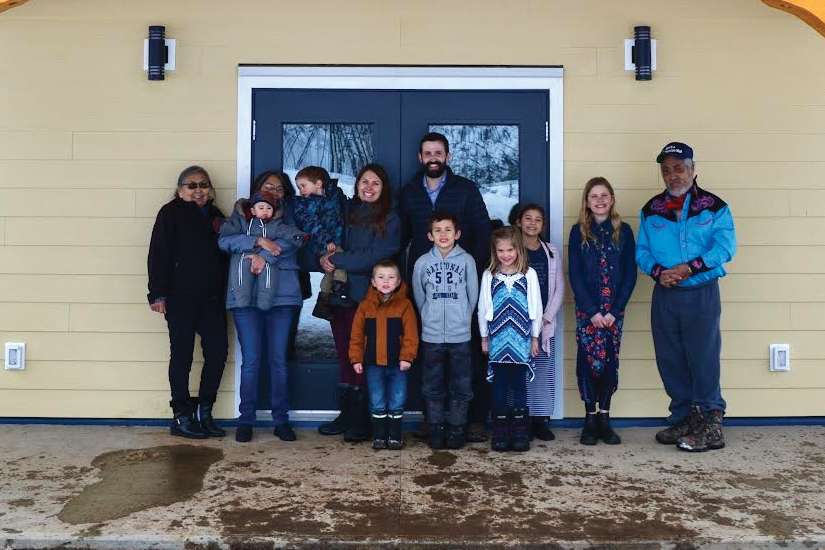Bishop Hector Vila of the Diocese of Whitehorse had to deliver a double gut punch to the family.
“He called to let us know that the church and the house were gone — completely burnt to the ground,” recalled Denise. “There was no trace of the bell — nothing. There were just little shards of stuff remaining because the flames were so hot.”
The Grimards are lay pastoral administrators for St. Theresa’s Mission Church situated in perhaps the most remote community in northern B.C. Because of Telegraph Creek’s isolation, Denise and Joshua received a special dispensation to celebrate liturgical services, anniversaries, weddings and funerals.
They also poured their passion into St. Theresa’s Mission by constructing an atrium for the parish. Joshua utilized his handyman skills to construct the little tabernacle, altar, lectern, sacristy cabinet and shelving.
Elders of the Tahltan First Nation — the Tahltan people are spread among Telegraph Creek, Dease Lake and Iskut, B.C. — also lent their talents to St. Theresa’s by making liturgical vestments. A key achievement for the Grimards was inspiring their neighbours to take ownership of their local parish to make it vibrant and reflect the community’s character.
By 2018, the family had established roots in the town with a population of about 250 people located at the convergence of the Stikine River and Telegraph Creek. It had been four years since Denise and Joshua made their life-altering choice to resettle.
“It was an experience where we initially felt like outsiders in our own country,” said Denise. “For the first time, we felt like we didn’t belong in a sense as we were living with a 95-per-cent First Nations community.
“It was totally new, but after a while we realized we could identify with anyone who might be new to Canada as an immigrant.”
Surpassing the two-year milestone living in Telegraph Creek proved to be a momentous development.
“Initially the bishop said he would like for us to commit to two years and to see where it goes from there,” said Joshua. “He said, ‘I just want you to go have tea with people.’ That was the spirit we carried into Telegraph Creek. Just to be with the people and get to know them.”
Denise added that the Tahltan people also acknowledged two years as a landmark. Crossing that key date signified that the Grimards were not temporary visitors — they were fully committed citizens of Telegraph Creek.
Because of the forced evacuation of the community due to the fire, Denise and Joshua stayed with family on vacation longer than intended. During this time, the couple was asked if they could go back in light of the destruction.
“We thought in our hearts, ‘how can we not go back,’ ” said Denise. “We said ‘this our home,’ and we thought we would be abandoning the people and the mission if we didn’t go back. It didn’t feel right.”
They decided to return home, albeit in nearby Dease Lake two hours away for most of two years between September 2018 to 2020, just like many other Telegraph Creek inhabitants.
Rebuilding St. Theresa’s became the magnum opus project for the Grimards for the next two years. Joshua led the charge as project manager.
“I was ultimately asked to take on the project, which was nice because my father is a construction contractor so I had a lot of different places to go for input,” he said. “We also had local guys with expertise in drywall and painting so that was nice to involve the community in that way.”
Joshua also conversed with the local elders to hear their desires for the new church so the undertaking would be a true community effort each step of the way.
There were some hurdles. For one, transporting materials to an isolated community is a very costly enterprise. Catholic Missions In Canada disbursements, crowdfunding and other donations eased the burden, however.
COVID-19 restrictions in effect during fall and winter caused the parish re-opening to be a bit of an anticlimactic affair as the intended November consecration was delayed until July.
“God works through that,” said Denise. “God works through everything if you have the eyes to see that. The local people were so blessed by the experience. Part of the building process was to continue forming that fellowship and that was manifested.”
Now the couple will seek to keep fostering that tight-knit spirit in new ways. On the back of well-earned relationships established over seven years, the couple is ready to explore spiritually deeper waters with their neighbours.


